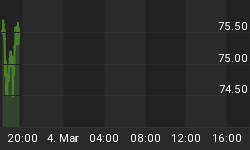Gold Finds Support, "Getting Bullish" as Bank Regulation & Moral Hazard Spark Political Rows
THE SPOT PRICE OF GOLD held steady in a tight range early Thursday, unchanged for the week after Monday's 1.4% drop, as European shares fell for the fifth day running.
US crude oil futures ticked lower towards $70.80 per barrel, while US Treasury bonds also slipped, knocking the yield offered by 10-year government debt up to 3.71%.
"After gold held its long-term trend line for the last three days running, the market is starting to get more bullish," says metals dealer Mitsui.
"Gold has found support the last three days near the 927 level," agrees Russell Browne in his technical analysis from London market-makers Scotia Mocatta.
"That's the 50% retracement level of our 865 to 990 up move [and] the 100-day moving average near 925 has also held firm despite a bearish move in gold. [But] this consolidation will have to continue longer before the market gains confidence for a reversal."
For Sterling investors today, the British Pound continued to come under pressure, sinking two cents to $1.62 on news of fast-falling Retail Sales, May's record UK government deficit, and open disagreement over City regulation between central-bank chief Mervyn King and finance minister Alistair Darling.
That helped drive the Gold Price in Sterling up to a one-week high above £578 per ounce. Eurozone investors now Ready to Buy Gold saw the morning Fix in London set near €672 for the fourth session running.
Today's European and North American press all carry reports of the "Gold to Go" vending machine now installed at Frankfurt airport, where passengers can pay €30 for 1-gram wafers currently worth less than €22 at spot market prices.
Claiming to offer better value than German banks - and telling the New York Times that his vending machines are intended to help promote his investment-fund business - Romy Erhardt of the supplier TG-Gold-Super-Markt told the London Times that his mark-up is around 20% above market prices.
Gold Coin dealers in Germany are charging around 10% more than wholesale spot valuations on average. Buying Gold directly from the professional market online at sites such as BullionVault.de, investors can choose to cut those costs by four-fifths or more.
"The whole point of BullionVault is to get you out of the retail market and into the professional wholesale market," as we told the Motley Fool in its Money Talk podcast this week.
Rather than losing out to high margins and mark-ups, "Gold is about preservation of wealth." (You can download the full Motley Fool podcast here...)
On the political front early Thursday, Russian president Dmitry Medvedev told reporters that he's agreed with Chinese leaders to reduce using US Dollars in their bilateral trade, switching to Yuan and Rubles instead.
Also attending the inaugural BRIC summit in Yakaterinburg, Brazilian president Lula da Silva denied that Brazil, Russia, India and China had discussed buying each others' bonds to avoid increasing their position in US Treasuries.
"The US Federal Reserve is very unlikely to subordinate its domestic policy objectives to the needs of the international economy," writes former International Monetary Fund (IMF) division chief Ousmene Mandeng in the Financial Times. "Yet today there is no single alternative to the Dollar. There are prospective difficulties of reaching consensus on a truly international currency."
President Obama's new finance industry rules were meantime attacked by the American Securitization Forum - a group which includes Goldman Sachs and J.P.Morgan as members - which said his regulation plans "may not be the most effective way" to revive the mortgage-bond market.
In Switzerland, in contrast, the Swiss National Bank (SNB) told banking giants Credit Suisse and UBS that they will not be rescued again should a similar crisis strike in future, but would rather be split up and either sold off or allowed to fail.
Also calling for international agreement to avoid the "moral hazard" stemming from implicit government support, the SNB was backed by comments from Deutsche Bank CEO Joe Ackermann.
The question now is "How can banks be reduced to such a size that they can be allowed to collapse without bringing down the whole system?" he told a conference.
The collapse of Bear Stearns in March 2008 saw the Gold Price in Dollars hit its current all-time high of $1,032 an ounce. The price then surged for UK, European and other non-Dollar buyers after Lehman Bros. failed last autumn.
At last night's annual Mansion House speech in the City of London, Bank of England governor Mervyn King said that "in the United Kingdom, the financial sector became too big and too highly leveraged. The size of our banking system was, as a proportion of GDP, five times that in the United States, and the risks to the UK taxpayer correspondingly greater."
Speaking at the same event, however, chancellor Alistair Darling called instead for "a change of culture" so bank staff are "rewarded for long-term success, not for failure."
















